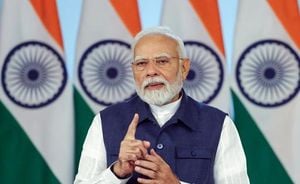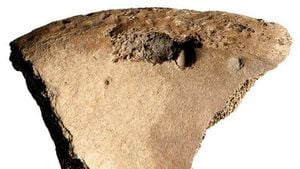Zambia's Barbra Banda has made headlines for more than just her incredible football prowess; she has recently been at the center of controversy after being named BBC Women's Footballer of the Year for 2023-2024. This prestigious award was voted on by fans online and recognizes her standout performances over the past year, which included remarkable feats at the Paris 2024 Olympic Games.
Specifically, Banda impressed with her hat-trick against Australia, not only showcasing her skills on the field but also cementing her position as one of the leading figures in African women's football. The striker, who plays for the Orlando Pride, topped the voting from readers of the BBC Sport website, declaring her as the standout choice among the finalists.
Banda's accolade doesn't only celebrate her on-field achievements but also marks her as only the second African footballer to receive this honor, following Nigerian star, 2015 winner, and fellow sensation, Assisat Oshoola. Earlier this year, Banda shone brightly in the National Women's Soccer League (NWSL), scoring 13 goals during the regular season, and she continued to carry the momentum through the playoffs. Her contributions helped the Orlando Pride acquire their first-ever NWSL title, illustrating her pivotal role within her team.
Despite the excitement surrounding her achievement, Banda's past continues to haunt her. The backdrop for this celebration is the scrutiny she faced during the 2022 Women’s Africa Cup of Nations (Wafcon), where she was withdrawn from the tournament due to alleged high testosterone levels. The Zambian Football Association explained at the time it was mandatory for players to undergo gender verification tests as per confederation regulations. Banda opted against accepting hormone suppression treatments, stating her hesitance about potential side effects. The situation raised eyebrows and echoed larger discussions surrounding gender eligibility in women's sports.
This past experience has resurfaced amid her latest awarding accolade, igniting fierce debates and backlash on social media. Critics have lashed out, alleging unfair advantages due to her biological traits and accusing her of 'cheATING' other female athletes out of opportunities. Harry Potter author J.K. Rowling is among the notable figures who have criticized the BBC for awarding Banda, labeling it as disrespectful to women athletes. Tracy Edwards, former round-the-world sailor, dubbed it the "destruction of women's sports," raising questions about the fairness and integrity of competitive categories. Social media has also been rife with accusations questioning her gender identity.
The controversy has led the BBC to stand firm on their decision, emphasizing their separate roles from the selection process, which involved independent experts who nominated candidates based on their performance over the year, followed by public voting. Banda has voiced her gratitude for the recognition, stating, “I’m shocked and surprised to have this award right by my side. I would like to thank the people who voted and everyone who has played a part in my life and my career—my family, my national team in Zambia, and especially the Pride team.” Her win was especially poignant for young women aspiring to make it big, as she conveyed, “to the young girl in Africa dreaming big, keep dreaming and working hard.”
Following the backlash from her win, what remains evident is the rising scrutiny and debates brewing over the participation of athletes with naturally high testosterone levels. This discussion challenges contemporary norms within competitive sports, particularly among women. Many advocates argue for stringent regulations on gender eligibility to protect fair play.
Banda has been under significant scrutiny to meet competitive eligibility standards, prompting discussions on the regulations governing women's sports and their adaptation to inclusive policies. She was previously subjected to the debate during the Wafcon incident, which adds layers to the contentious discussions instigated by her recent achievements.
Not too long ago, the Confederation of African Football emphasized the importance of these verification requirements, stating its commitment to ensuring fairness among competitors. This has presented complex quandaries as governing bodies attempt to balance inclusiveness versus ensuring fair competitions. Banda's emergence as one of the prominent stars of women’s football has not only brought accolades but also stirred fierce debates around inclusion and what constitutes fairness.
Addressing the topic of comparative advantages remains nuanced, as advocates stress the need for science and research to guide where regulations may go. Reports indicate some athletes have resorted to hormone treatments or surgical options to conform, which has added tension within women’s sports about the potentials and ethics of such paths.
Barbra Banda's story demonstrates the rapidly shifting landscapes of women’s sports, where every triumph is weighed against historical biases and contemporary expectations. The rising female athlete's efforts to break barriers come met with increasing scrutiny, challenging notions of what can and should be deemed fair play. With her recent recognition echoing achievements, the future of women's sports remains enmeshed with these discussions. The debate will likely continue as public sentiment evolves, with the focus now shifting to maintaining as much fairness as possible for all competitors.



